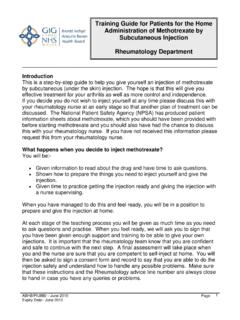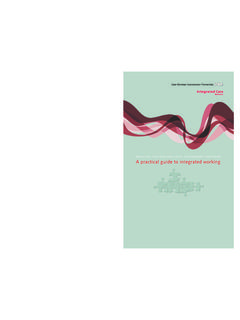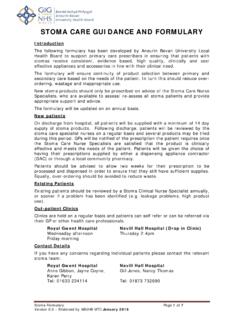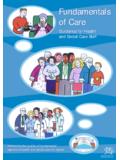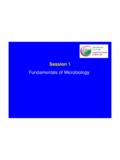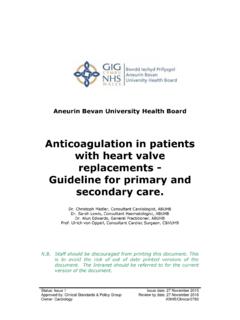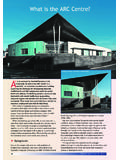Transcription of ADULT REFEEDING GUIDELINES - NHS Wales
1 HYWEL DDA LOCAL HEALTH BOARD ADULT REFEEDING GUIDELINES Managing patients at risk and preventing REFEEDING syndrome Policy Number: 209 Supercedes: Standards For Healthcare Services No/s Standard 14 Version No: Date Of Review: Reviewer Name: Completed Action: Approved by: Date Approved: New Review Date: 1 Nov 2011 Rachel Lewis Actions as recommended by the CPRG 20th May 2011 November 2013 Brief Summary of Document: Guidance to support the safe recognition and management of REFEEDING syndrome in adults To be read in conjunction with: National Institute of Clinical Excellence (NICE) nutrition support in adults Clinical guideline 32 2006.
2 Best practice advice on the care of adults who are malnourished or at nutritional risk. Oral Feeding Difficulties and Dilemmas report of a working party. Royal College Physicians January 2010 Management of really sick patients with Anorexia Nervosa (MARSIPAN) College report CR162. Royal college of Psychiatrists and Royal college of Physicians, October 2010. Classification: Clinical Category: Guideline Freedom Of Information Status Closed Authorised by: Kathryn Davies Job Title Dir of Therapies, and Health Sciences A signed copy of this policy is held within Corporate Services. HYWEL DDA LOCAL HEALTH BOARD Database No: 209 Page 2 of 32 Version 1 ADULT REFEEDING GUIDELINES Responsible Officer/Author: Rachel Lewis Job Title: Clinical Lead Acute nutrition support Contact Details: Dept Nutrition and Dietetics Base Glangwili hospital Tel No 01267 227067 E-mail.
3 Scope ORGANISATION WIDE DIRECTORATE DEPARTMENT ONLY COUNTY ONLY Staff Group Administrative/ Estates Allied Health Professionals Ancillary Maintenance Medical & Dental Nursing Scientific & Professional Other CONSULTATION Please indicate the name of the individual(s)/group(s) or committee(s) involved in the consultation process and state date agreement obtained. Individual(s) Rachel Lewis Dr R Canavan Dr N Haboubi Peter Johnson Sue Beach Date(s) August 2010 Group(s) Acute Dietetic Nutrition Clinical Practice group Virtual Nutrition group Date(s) August 2010 Committee(s) Hywel Dda nutrition steering group Date(s) Dec 2010 RATIFYING AUTHORITY (in accordance with the Schedule of Delegation)
4 KEY COMMENTS/ POINTS TO NOTE NAME OF COMMITTEE A = Approval Required Date Approval Obtained FR = Final Ratification Clinical Policy Review Group FR Jan 2012 Date Equality Impact Assessment Undertaken June 2011 Group completing Equality impact assessment Jackie Hooper Rachel Lewis Please enter any keywords to be used in the policy search system to enable staff to locate this policy REFEEDING , enteral, parenteral, nutritional risk HYWEL DDA LOCAL HEALTH BOARD Database No: 209 Page 3 of 32 Version 1 ADULT REFEEDING GUIDELINES Document Implementation Plan How Will This Policy Be Implemented? Through usual guideline distribution channels, see detail below.
5 Who Should Use The Document? All clinical staff should be aware of the guideline What (if any) Training/Financial Implications are Associated with this document? Training / awareness for all medical staff and secondary care pharmacy teams delivered by Dietetics. Plan rolling programme for learning session through learning and development and post grad. What are the Action Plan/Timescales for implementing this policy? Action By Whom By When Approved guideline sent for signing Rachel Lewis Jan 2012 Signed guideline made active on intranet Policy Coordinator Jan 2012 Active guideline advertised via global e-mail Dietetics Jan 2012 Awareness sessions across the health board Dietetics Jan 2012 Cascade of guideline through locality nutrition groups Dietetics Jan 2012 Post graduate teaching sessions in each locality Dietetics Jan-Feb 2012 Promotion of guideline via nutrition steering groups Dietetics March 2012 HYWEL DDA LOCAL HEALTH BOARD Database No: 209 Page 4 of 32 Version 1 ADULT REFEEDING GUIDELINES CONTENTS 1.
6 2. GUIDELINE 3. 4. 5. 6. DEFINITION OF REFEEDING 7. IDENTIFICATION OF PATIENTS AT RISK OF REFEEDING 8. STARTING NUTRITION ON PATIENTS WITH AN IDENTIFIED RISK OF REFEEDING 9. 10. GUIDELINES FOR THE PROVISION OF ELECTROLYTES, THIAMINE OTHER 11. 12. 13. IMPLEMENTATION AND 14. CLINICAL POLICIES 15. 16. APPENDIX PATHOGENESIS OF REFEEDING CLINICAL SEQUELLAE OF ALTERED BMI PERCENTAGE WEIGHT LOSS NUTRITIONAL CONTENT OF VITAMIN AND MINERAL REFEEDING SYNDROME FLOW CHART QUICK REFERENCE HYWEL DDA LOCAL HEALTH BOARD Database No: 209 Page 5 of 32 Version 1 ADULT REFEEDING GUIDELINES 1.
7 INTRODUCTION There is an identified need for clinical guidance for initiating oral, enteral or parenteral feeding in ADULT patients who are at risk of REFEEDING syndrome. These GUIDELINES have been produced to provide guidance for staff within Hywel Dda Health Board about the requirements and processes for re-feeding syndrome. Nutrition is a fundamental element of care. Evidence suggests that 1 in 3 adults admitted to hospital are at risk of malnutrition (British Association of Parenteral and Enteral Nutrition (BAPEN), 2010). A percentage of these patients will have chronic poor nutrition or due to their acute illness have a period of significant poor nutrition that may predispose them to REFEEDING syndrome and associated complications.
8 This risk must be recognised and managed appropriately to avoid consequences of REFEEDING syndrome. All ADULT patients admitted to secondary care must be nutritionally screened and re-screened weekly as a minimum throughout their hospital stay (NICE, 2006). Screening is undertaken by the nursing staff at ward level and provides a means of identifying patients at high nutritional risk. The nutritional screening tool indicates potential REFEEDING risk and prompts the nurse to consider the patients risk of REFEEDING and highlight at risk patients to the doctor. 2. CONSENT TO TREATMENT All patients with a poor nutritional status should be actively involved in decision making regarding their feeding plan and the management of potential REFEEDING risk.
9 The Royal College of Physicians (2010) state Those with intact cognitive function who are unable to eat or drink must be involved in decision making as their perception of the process resulting from absence of food will be different from those with absent cognitive function . If there is a doubt about the patient s mental capacity to consent to REFEEDING , the person providing the treatment should undertake a formal assessment of capacity in line with the Mental Capacity Act 2005. If the patient is found to lack capacity to make the decision for themselves treatment may proceed in their best interests. 3. PATIENTS WITH EATING DISORDERS Patients with eating disorders are at significant risk of REFEEDING syndrome and may be being admitted for safe REFEEDING (although this may not be the only reason for an admission).
10 Some patients with an eating disorder may lack capacity to make a decision around treatment because of an inability to understand or retain relevant information, or an inability to communicate their decision . Moreover, the nature of eating disorders may increase the likelihood that patients are unable to use or weigh relevant information. Whilst the patient may understand information about the consequences of not eating, their compulsion not to eat might be too strong for them to ignore (MCA Code of Practice paragraph ) and they would then not have the capacity to decide whether or not to accept treatment. If the case is complex and there is uncertainty about the patient s capacity, then it may be helpful to obtain a second opinion from a psychiatrist or psychologist.

